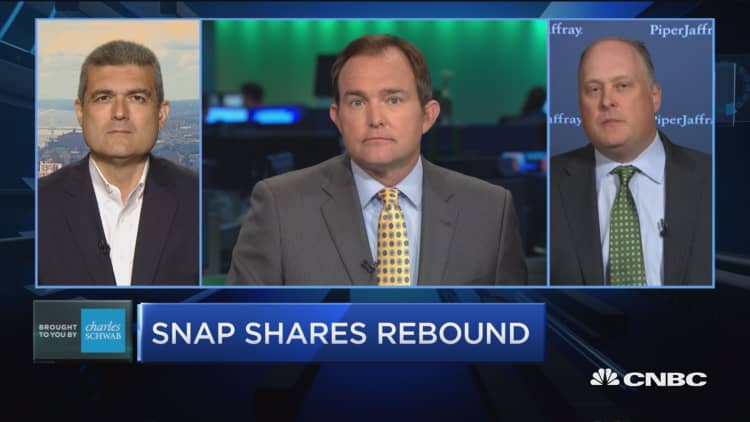
Shares of Snapchat parent Snap in Tuesday trading saw a second straight day of gains, buoyed by an upgrade from Cantor Fitzgerald which cited an improved reward-to-risk relationship following the stock's lockup period expiration.
Still, some strategists see a choppy road ahead for the stock that's declined nearly 25 percent since its initial public offering five months ago.
Snap, since rallying up toward $30 per share in March shortly after its $17 IPO, has been making "nothing but a series of lower lows and lower highs since," said Craig Johnson, chief market technician at Piper Jaffray. The stock's trend has clearly been downward since it began trading.
"It's going to take a close above about $13 to reverse a little of the short-term downtrend. Longer-term, you need a close above $15, or $16, to reverse that downtrend," Johnson said Monday on CNBC's "Power Lunch."
He noted that his firm's analyst covering Snap, Samuel Kemp, carries a "neutral" rating on the stock given longer-term structural issues with the company. Indeed, Kemp's price target is a slightly bearish $12.50. He noted in a recent research report that monetization continues to lag expectations in North America, partially caused by the company's shift of advertisement sales.
Snap is "clearly losing market share to Instagram" despite being one-third the size, and has established a "weakening narrative that extends outside of the Street to advertisers who are deciding where to allocate ad spend."
Cantor Fitzgerald analyst Kip Paulson, who in his bullish note published Tuesday morning raised his rating to "overweight" from "neutral" though leaving his $15 price target unchanged, wrote that the bulk of Snap's locked-up shares are now free for trading, and thus "much of the negative impact should now be behind the company." Furthermore, Snap's valuation has improved "substantially" since its IPO, Paulson wrote.
As beaten-up as the company is at these levels, said Boris Schlossberg, managing director of foreign exchange strategy at BK Asset Management, he wouldn't go so far as to short the stock simply because of what he sees as the potential for mergers and acquisition activity in the future.
"Snap, as weak as it is, is still the only viable social platform that Google can take out, and then participate in display advertising. Between the two of them, Google and Facebook have 20 percent of the global advertising budget. And the battle now is all about capturing more of those advertising dollars going forward," Schlossberg said Monday on "Power Lunch."
"They could just come in, soup it up, and subsidize it for years to come until they figure out how they can monetize the advertising off of it," he added.
The company's latest quarterly earnings report, released last week, reflected weakness on multiple fronts. The company's quarterly revenue, earnings per share, daily active users and average revenue per user all missed analysts' expectations, sending the stock plunging more than 14 percent.





